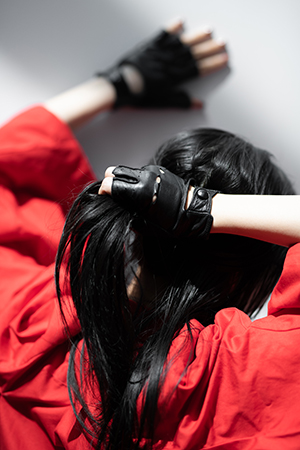Divergence & Convergence: T. Liem interviews Kawai Shen

Past contributor T. Liem talks with Kawai Shen, whose story "The Hanged Man" appears in our fall issue #224. They discuss ecosystems of creativity, the different types of power imbalances in her story, and what we choose to perceive or ignore about people.
Kawai Shen is a writer based in Toronto. http://www.kawaishen.com
https://kawaishen.bsky.social
“The Hanged Man” portrays what it’s like to have a tense relationship with the future: Queenie finds the predictability of an affair exciting, but this and other inevitabilities also fuel a deep dissatisfaction with the present. Would you talk about how you approach writing a so-called predictable story?
I'm often exploring different types of power in different ways in my writing. In “The Hanged Man,” this exploration occurs on two levels. I didn't set out to use this dual structure, but when I look back, I see that my approach drew from a couple works wherein there are both impressions that the characters have of each other and commentary shared directly with the reader that is not a part of the world of the story.
The first such work is Richard Lortz's Bereavements, a little oddity of a horror novel that's written with a running commentary of delightfully bitchy asides. The other is Margaret Atwood's short story, “Bluebeard's Egg,” which shares Lortz's biting tone, though it's less playful and more withering. As well, the Atwood also features a triangulated relationship told from the perspective of an intelligent dilettante who condescends to her male partner and might not be as clever as she thinks she is. It's the points of divergence and convergence (or collapsing) between these two levels where frisson can be generated instead of focusing solely on “what happens next?”
How do you think about the relationship between love and the erotic in this story, or in general in your writing? Although we are told Queenie has fallen in love with Ryan, I’m suspicious! In a different way, I see care between Queenie and Eunice, but love feels a little obscured, the same way they are obscured from each other, having sex with face masks on.
In “The Hanged Man,” both love and eroticism are sources of power mediated by other kinds of power. Queenie and Eunice share a great deal as antiracist, queer Chinese women, but their care and attraction are also related to differences in class and income, a power imbalance the couple never discuss directly. So yes, their connection is partly obscured. Who waits on who? How might we imagine their finances or division of household labour? How does class affect the way they interact with the white people in their lives?
We can contrast this with the power dynamic between Queenie and Ryan and where they draw power from. I can definitely see why one might not define their mutual attraction as love. To me, their connection carries a transgressive and transformative potential, the possibility of realizing different ways of feeling and perceiving, new ways of being in the world—and that potential is what makes the attraction ultra-salient and intoxicating. I would call this erotic love, but that's not to say the experience is inherently meaningful. It's not necessarily pleasant to experience this energetic surge. And just because you've tapped in, it doesn't mean you have the skills needed to exercise that surge ethically and wisely.
Contemporary sociopolitical issues are simmering in the background of “The Hanged Man.” We hear about Eunice’s work with an Asian Canadian arts collective, we see the commodification of spiritual practices in the store The Eighth Dimension, and Eunice’s mother, Evelyn, mentions a store where they sell “jade facial rollers for fifty dollars.” Would you talk about why the conversations between characters about these kinds of things are important to the story?
I included these conversations to help the reader map out the power dynamics between all the characters. They reveal not only how each character understands systems of social power but also how they speak (or don't speak) about such matters to the other characters. I'm also asking the reader to consider how impersonal power structures like white supremacy can foreclose how we conduct ourselves in intimate relationships. Who we are attracted to and why. How we care for or exploit each other. What we choose to perceive or ignore about people.
When it comes to analyzing intimate relationships, we have a tendency to rely on individual psychology, models like attachment theory and so on. What about other forces that compel us to act in certain ways? I think we're starting to see a growing recognition of a disjuncture between character-driven narratives and how the majority of people are experiencing their lives during a cost-of-living crisis and climate crisis. We could argue the main character that's driving almost everyone's story today is a dehumanizing global system of capitalist exploitation.
I read another story of yours in which a character visits an astrologer, and then this story takes its title from Tarot. What’s the relationship between these kinds of practices and writing for you?
From a pragmatic standpoint, occult systems provide a rich symbolic shorthand steeped in history that one can employ. It's a way of giving readers familiar with these systems another point of entry into the story. Beyond that, in “The Hanged Man,” spirituality is just as important as the aforementioned sociopolitical issues. It's another power source. And it gets the last word.
Who or what are your influences or inspirations lately, whether that be other fiction, music, movies, etc.?
The most recent reads I've been thinking a lot about are Almanac of the Dead by Leslie Marmon Silko (which I learned about through the podcast, The Unseen Book Club) and The Kurdish Women's Movement by Dilar Dirik (picked up while perusing Pluto Press' catalog). I've also been following so many interesting smaller publishers, far too many to list. But perhaps I'll mention there's been a lot of recent exploration into the possibilities of sex writing outside of traditional markets with publishers like Mal Journal, Extra Extra, Smutburger, etc. In a similar vein, I'm really looking forward to checking out Bruce LaBruce's The Visitor.
It's not quite influence or inspiration, but I'd also like to acknowledge groups building up artistic scenes, including the team here at The Malahat Review. We often elevate individual authors but I think it's important to recognize entire ecosystems of creativity—all the people involved, the spaces they inhabit, the resources that are shared.
I know that people can check out your website to find out more, but I’m wondering if there are any projects (writing or otherwise) that you’re particularly excited about that you want to let people know about here?
I've a fair amount of inventory to clear at the moment, including a couple book-length manuscripts, so hopefully I can keep updating my site at a steady clip! Readers who enjoyed “The Hanged Man” may like an article I recently wrote for Vestoj called “Make It Till You Fake It.” (It's written with a similar sense of humour and tackles race and class in luxury fashion counterfeits.) I'll also take this opportunity to plug the smut I write because smut is so marginalized in publishing. Though I figure Marian Engel set a good precedent for CanLit with Bear.

T. Liem









